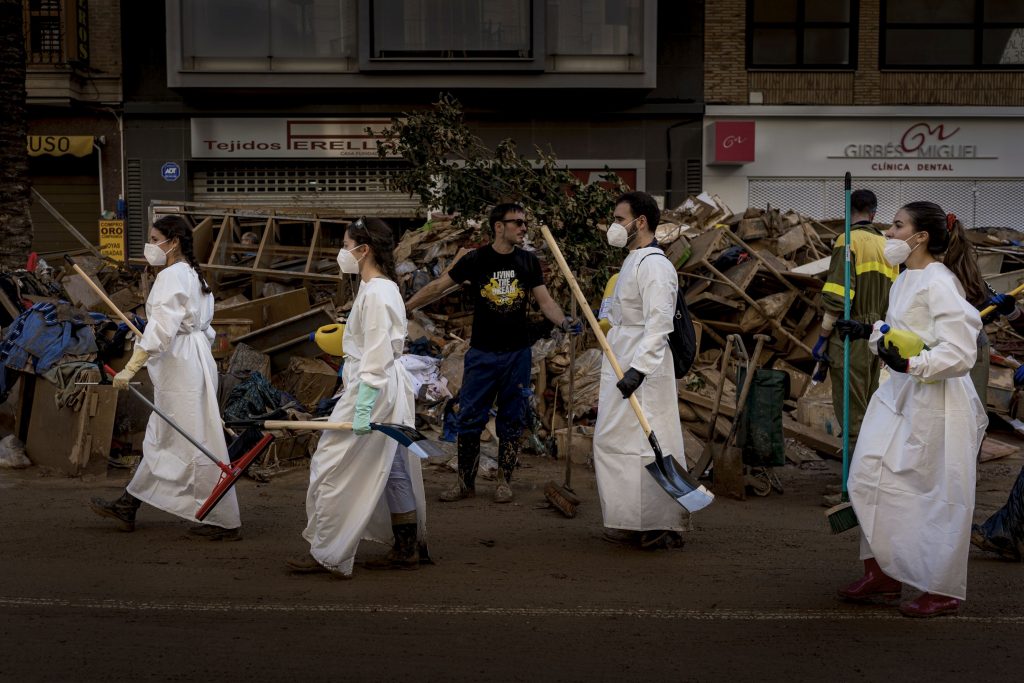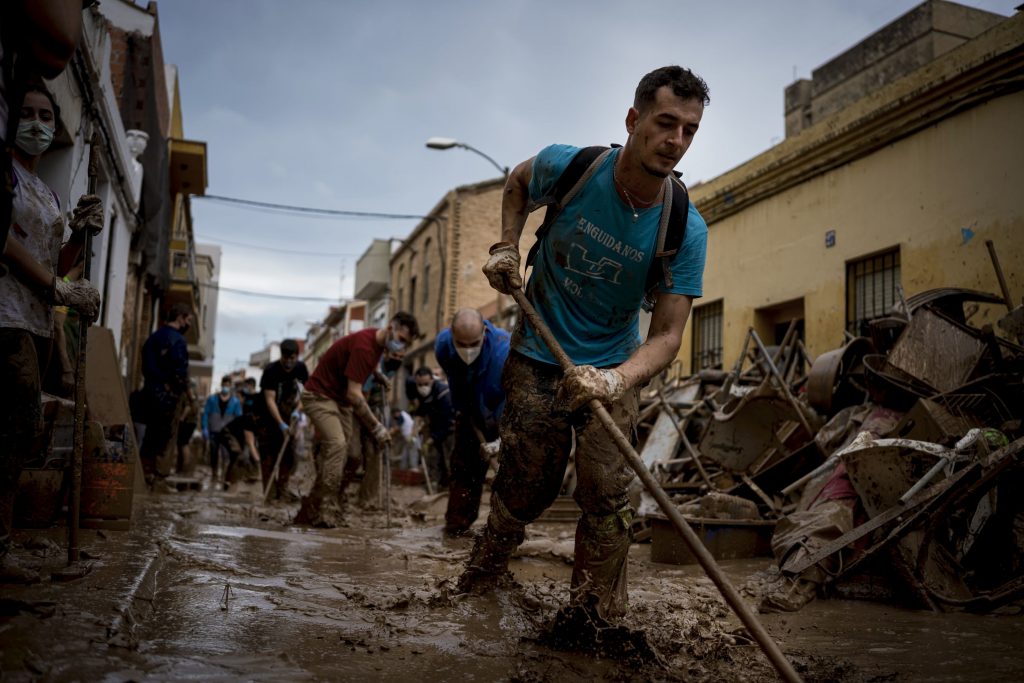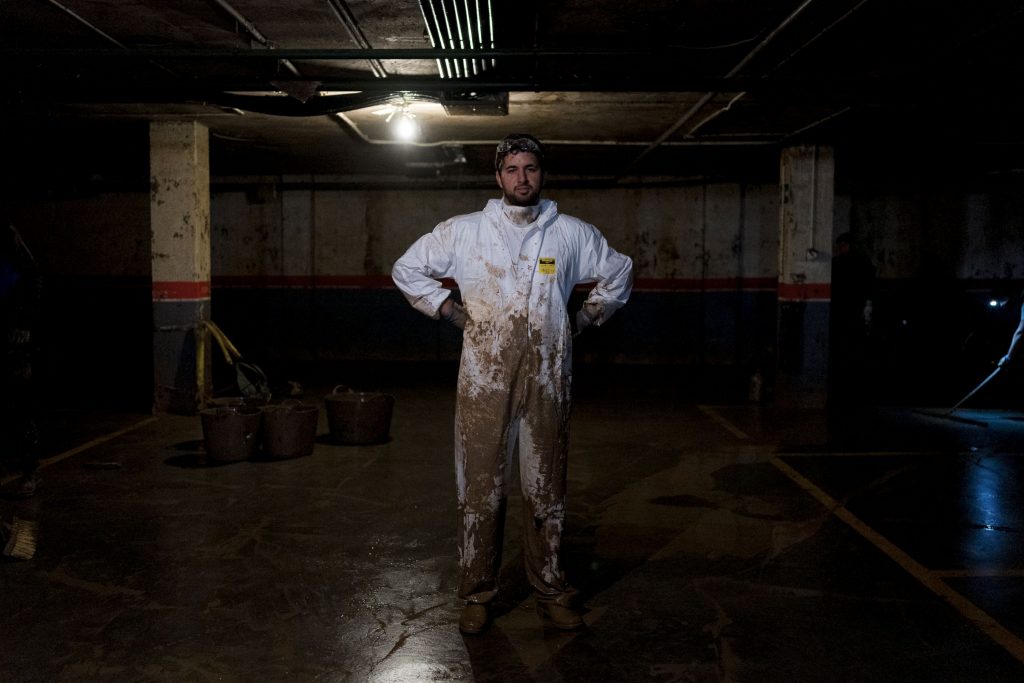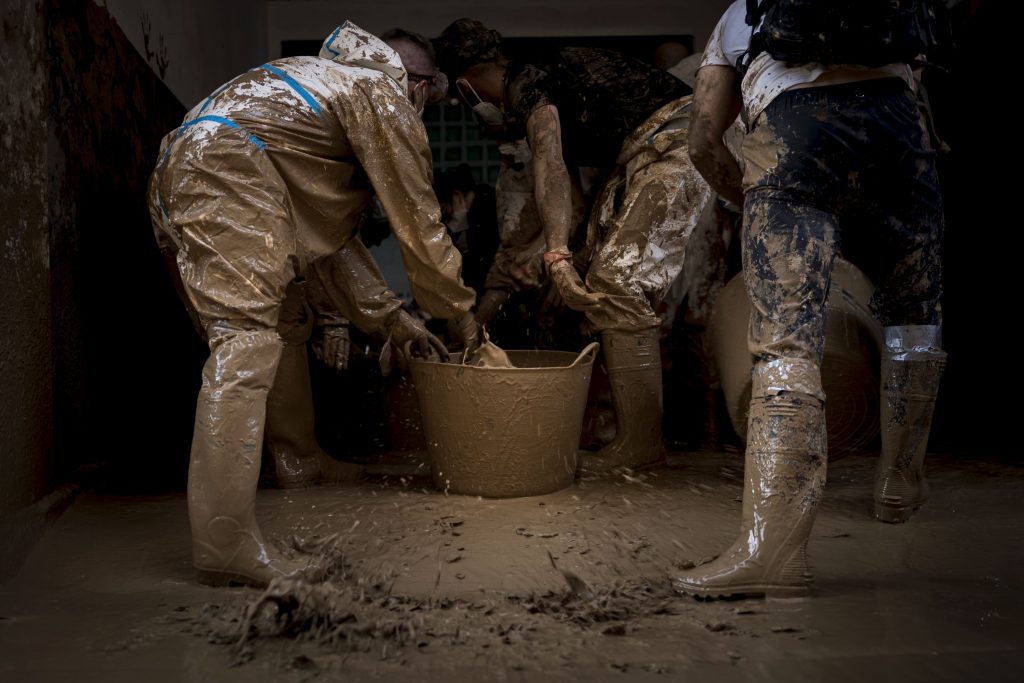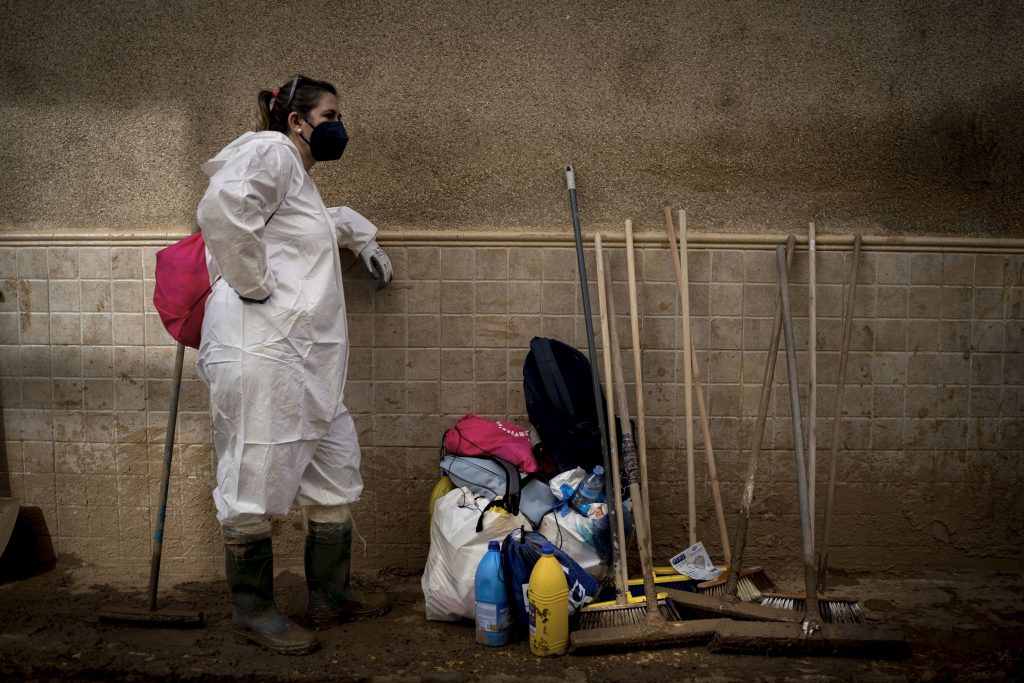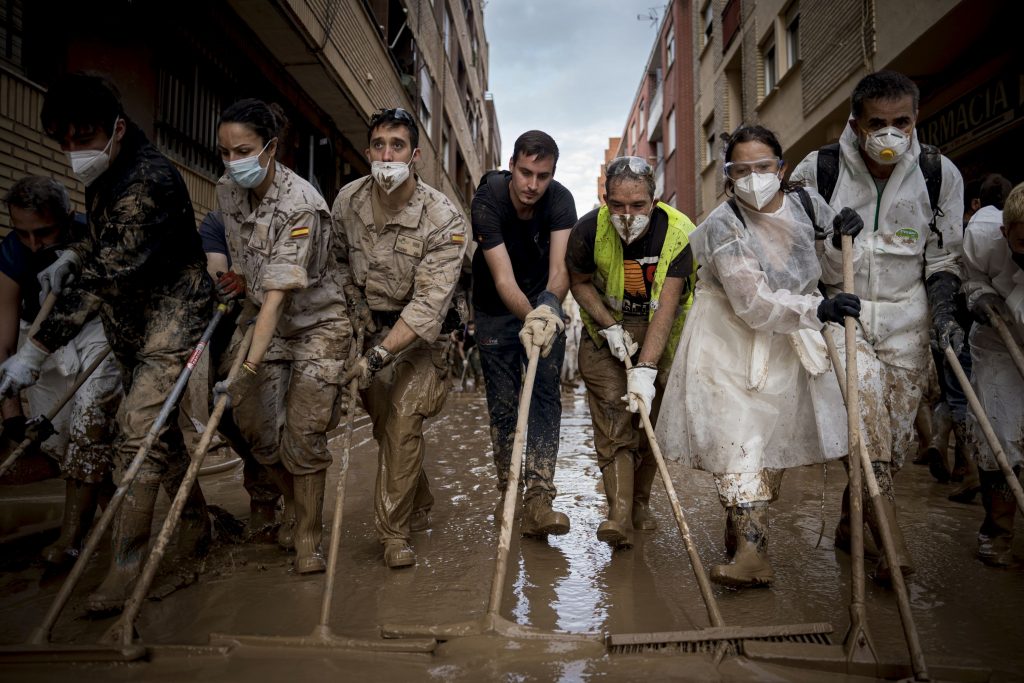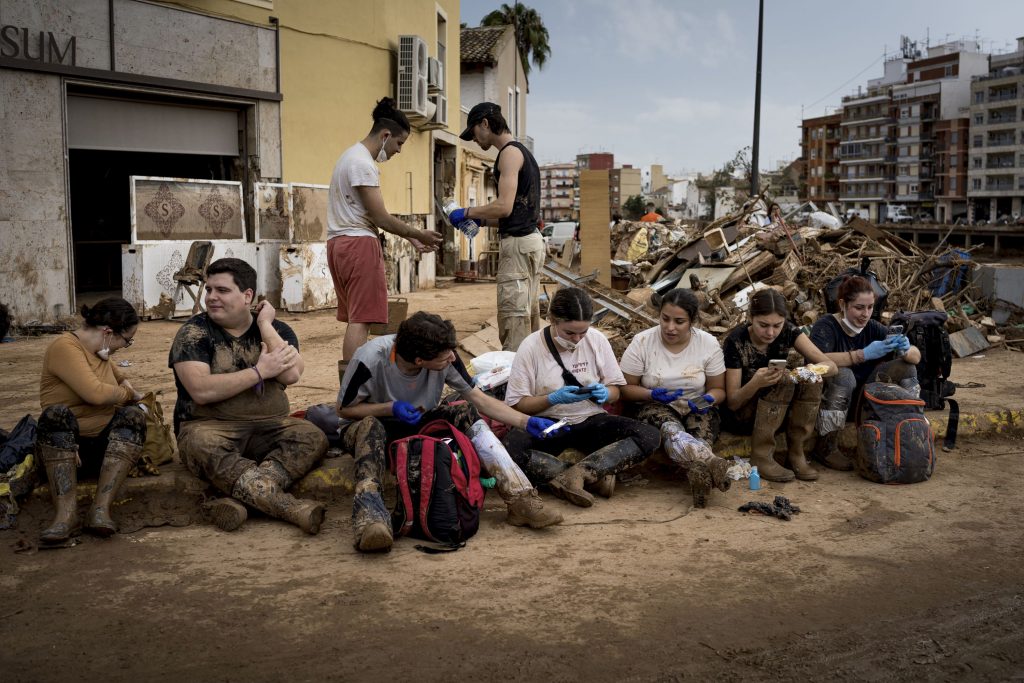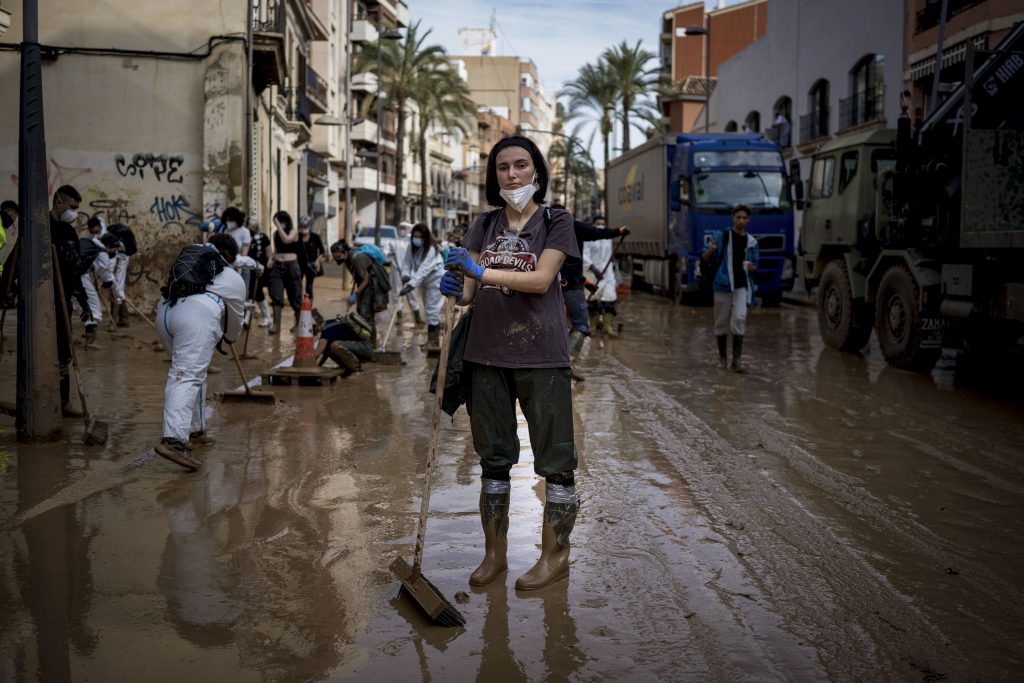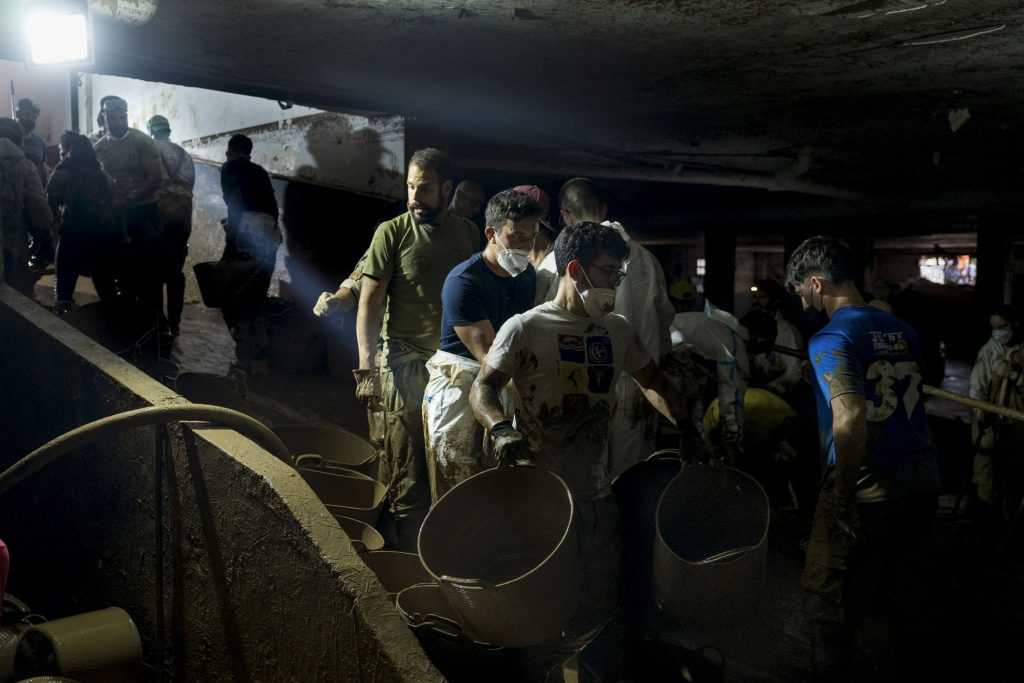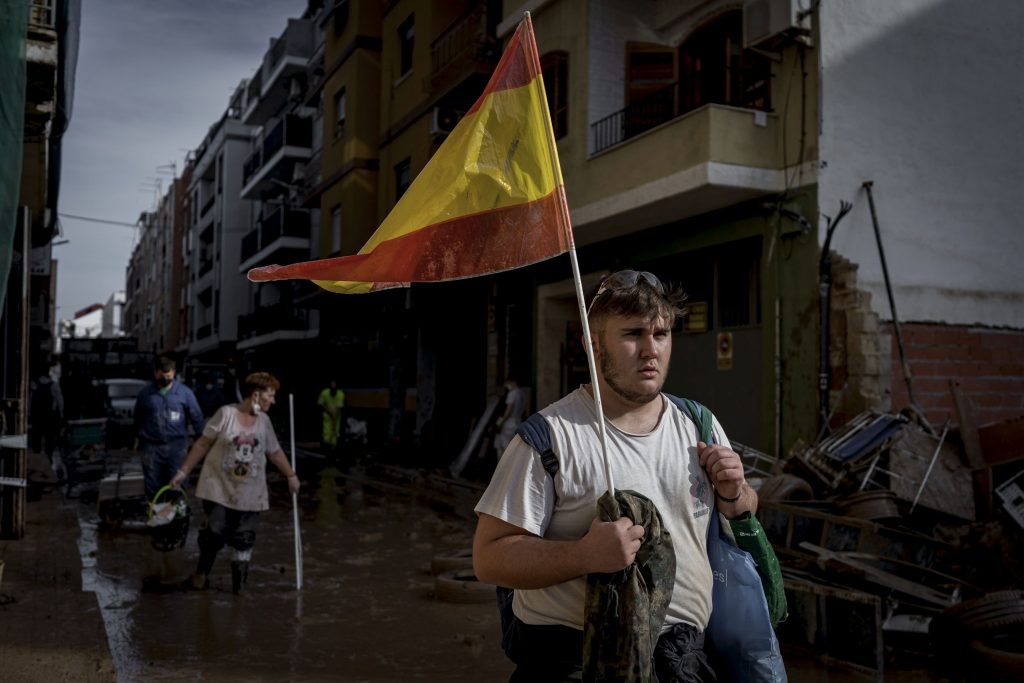Testo Valencia
Francisco Giner Rando explodiert. Seit dem ersten Tag ist er als
Betroffener und Freiwilliger in seinem Quartier unterwegs, «im
Kriegsgebiet», wie er sagt – erschöpft vom Helfen, geladen vor Wut:
«Wie kann es sein, dass wir bis heute keine staatliche Hilfe erhalten
haben?», brüllt er ins Aufnahmegerät. «Unsere Politiker sind Mörder,
denn sie wissen, was passiert ist, und sie schweigen bis heute.»
Giner Rando sitzt in seinem weissen Schutzanzug auf einem
Plastikstuhl am Strassenrand irgendwo in Catarroja, einer Kleinstadt,
die an Valencia grenzt. Seine Gummistiefel sind schlammverklebt,
im Hintergrund dröhnt eine Polizeisirene. Gleich um die
Ecke haben Dutzende von Freiwilligen eine Menschenkette gebildet,
um Kübel voller Schlamm aus einer Tiefgarage zu schleppen.
Sie kippen die säuerlich riechende Masse auf die Strasse und schieben
sie mit Besen in Richtung Kanalisation.
Es ist Tag elf nach der Flutkatastrophe bei Valencia, und die
geschwollenen Augen Giner Randos widerspiegeln, was er seit
dem 29. Oktober gesehen hat: die in den Wehen liegende Frau,
die ins Spital wollte, wegen des Schlamms aber kaum die Haustür
aufbrachte. Oder den Mann aus seiner Nachbarschaft, der alleine
lebt, aber wegen Alterssenilität nicht verstand, warum er seit
drei Tagen weder Wasser noch Licht hatte. Giner Rando und seine
Freundin Alejandra Inés Vásquez Salinas, eine Krankenpflegerin,
schabten die Fäkalien von seinen Beinen und Füssen, wuschen
Kopf und Körper und zogen ihn frisch an.
Kaum hatten die Nachbar:
innen
des Betagten mitbekommen,
dass Hilfe gekommen war, öffnete sich eine Tür nach der
anderen. Es fehlte an Trinkwasser, an Lebensmitteln, an Medikamenten.
«Während wir hier sprechen, sterben Menschen in ihren
Wohnungen», sagt Giner Rando. «Nur werden sie nicht mehr offiziell
mit der Flut in Verbindung gebracht.» Was sich in Spanien
derzeit abspiele, sei eines Rechtsstaats unwürdig, ja beschämend.
Immer noch gibt es Vermisste
Ganz Spanien diskutiert über die Katastrophe, die dafür Verantwortlichen
und ihre Bewältigung. Vor zehn Tagen empörten sich
im Stadtzentrum Valencias 130 000 Menschen und forderten den Rücktritt der Regionalregierung, Einzelne auch von jener in
Madrid.
Doch bis heute will niemand klare Kante zeigen: weder
die Regionalregierung, die ihre Katastrophenwarnung erst losschickte,
als die ersten Menschen bereits ertrunken waren, noch
die Beobachtungsstelle regionaler Gewässer, die an diesem Tag
ihre Aufmerksamkeit auf den Fluss Magro richtete, die Rambla
del Poyo aber ausser Acht liess. Dieser Kanal sollte die südlichen
Vororte Valencias bis zu drei Meter unter Wasser setzen. Auch in
der Hauptstadt scheint man die Überschwemmung bis jetzt nur
halbwegs ernst zu nehmen. Ministerpräsident Pedro Sánchez
wäre zwar befugt gewesen, Katastrophenalarm auszulösen und
Evakuierungen anzuordnen, stattdessen verliert sich der Sozialist
in Schuldzuweisungen an die konservative Regionalregierung.
Von der Flut betroffen sind in der Provinz Valencia 75 Gemeinden
mit 845 000 Einwohner:
innen,
verteilt auf 530 Quadratkilometer.
Das ist mehr als die Fläche des Kantons Baselland.
1522 Kilometer Strassen, 99 Kilometer Bahnstrecke sowie Zehntausende
von Hektaren Landwirtschaftsfläche. Beschädigt oder
ganz zerstört wurden rund 120 000 Autos, 26 Brücken sowie
unzählige Werkstätten, Fabriken und Produktionsanlagen. Ein
Drittel der Arbeitsplätze der Provinz liegt im Überschwemmungsgebiet.
219 Menschen starben, auch fast 3000 Kühe und zahlreiche
Haustiere kamen um. Bei Redaktionsschluss wurden offiziell
noch elf Personen vermisst.
In den südlichen Vororten Valencias, die besonders schwer
getroffen wurden, messen die Wohnhäuser selten über vier Stockwerke.
Hier sind Zehntausende auf staatliche Unterstützungsgelder
angewiesen, andere haben keine Papiere und leben von
der Hand in den Mund. Viele pendeln täglich nach Valencia zur
Arbeit; sie leben hier, weil sie sich die Miete in der aufstrebenden
Metropole nicht mehr leisten können.
Das Bett wird zum Boot
Zu ihnen zählen auch Mario Torre Valero und Ana María Jiménez
Ballester,
deren Vermieterin den Mietzins von 400 auf 800 Euro
pro Monat erhöhen wollte. In Erwartung eines Babys entschieden
sich die beiden Anfang Jahr, in die Peripherie zu ziehen, in ein
kleines Häuschen, wenige Strassen neben der Rambla del Poyo.
Der 37-jährige Pöstler hat am Abend der Katastrophe gerade den
Hochstuhl seiner sieben Monate alten Tochter zusammengebaut,
als seine Schwester im Familienchat schreibt, dass Wasser ins
Häuschen der Eltern in Paiporta laufe. Sie ist dort bei ihrem Vater
zu Besuch, nur wenige Kilometer kanalaufwärts.
In den Hügeln im Westen der Stadt hat es innert weniger
Stunden so viel geregnet wie sonst in einem Jahr. Die Wassermassen
preschen Richtung Küste, reissen Brücken, Gleise und
Bäume mit sich, brechen Garagentore und Haustüren auf und fluten
das Hab und Gut von Torre Valeros Eltern. Das Bett, auf das
sich die Schwester mit Tochter und Hund gesetzt hat, wird zum
Bötchen und nähert sich erschreckend schnell der Zimmerdecke.
Der Vater steht hüfttief im kalten Wasser, kann sich am Ende aber
auf ein Möbel retten. Valencias Vororte sind überschwemmt, ohne
dass dort ein Tropfen Regen gefallen wäre.
Währenddessen steigen in Catarroja Mario Torre Valero und
Ana María Jiménez Ballester mit ihrer Tochter in den Estrich. Danach
evakuiert Torre Valero auch die drei Katzen, stellt im Wohnzimmer
das Nötigste aufs Sofa und klettert schliesslich mit ein
paar Wertsachen in der Hand wieder hinauf zu Frau und Tochter.
Vom Estrich aus sieht er, wie die Waschmaschine im Wasser verschwindet,
und überlegt sich, wie die Familie notfalls aufs Dach
kommt. «Meine Frau beklagt sich sonst, dass ich ein langsamer
Typ bin», sagt Torre Valero in seinem inzwischen schlammfreien
Häuschen und lacht. «Aber in dieser Nacht lief alles instinktiv,
und ich war selber überrascht, wie schnell ich handelte.»
Als es in den Morgenstunden zu regnen beginnt, gerät Torre
Valero doch kurz in Panik. Erst als es hell wird und er realisiert,
dass das Leben seiner Familie gerettet ist, beginnt er zu weinen.
Die erste Woche übernachtet seine Familie im unverputzten
Estrich, zwischen Kartonschachteln und Katzen-WC unter dem
nicht isolierten Dach. Frau und Tochter ziehen später zum Schwager
nach Valencia, Torre Valero schrubbt weiter. Wie Francisco Giner
Rando fühlt er sich von den Behörden alleingelassen, erträgt
nur schwer, dass bis zum vierten Tag nach der Überschwemmung
weder Polizei noch Militär im Quartier auftauchen. Umso mehr
freut er sich ob der Nachbarschaftshilfe und der Freiwilligen. «Oft
werden die jungen Menschen heute kritisiert, dass sie nichts anderes
als ihr Handy im Kopf hätten, aber ohne ihre Hilfe würden wir
hier immer noch im Schlamm sitzen.»
Die Hilfsgüter kommen an
Tatsächlich sind es vor allem junge Menschen, die ins Katastrophengebiet
reisen. Die ersten klettern bereits am Morgen danach
über die Dächer der angeschwemmten Autos, klopfen an Haustüren
und Fenster und suchen nach Überlebenden. Angst und
Misstrauen sind zu diesem Zeitpunkt gross, sodass sie zuerst mit
Räuber:
innen
verwechselt werden – auch diese gab und gibt es –
und von den Nachbar:
innen
alles Böse zu hören kriegen.
Die Organisation läuft zunächst mündlich, später werden
Chatgruppen eröffnet, schliesslich installieren lokale Programmierer:
innen
eine interaktive Onlinekarte. Dort können Betroffene
Adresse und Bedürfnisse melden, Freiwillige ihre Fähigkeiten
und ihre Disponibilität kundtun. Millionen von Menschen haben
die Seite in den letzten Wochen aufgerufen. Selbst die Behörden
greifen auf das Tool zurück.
In den Baumärkten ganz Spaniens fehlt es bald einmal an
Stiefeln, Handschuhen, Schaufeln und Eimern: alles leer gekauft
von Hilfsorganisationen, Spender:
innen
und Freiwilligen aus
dem In- und Ausland. In den Quartieren haben die Nachbar:
innen
spontan Coiffeursalons in Apotheken und leer stehende Lokale in
Sammelstellen für Lebensmittel verwandelt.
Joana Alejandra und ihr Mann Jony Alexander bewirtschaften
eine Sammelstelle in Catarroja. Die Hilfsgüter kämen oft in
der Nacht, wenn die Zugangsstrassen leer seien, erzählen sie. Der
Schlamm ist hier bereits weggeräumt, und die Lieferungen aus
dem Baskenland, Madrid und Murcia können problemlos ins
Ladeninnere
gebracht werden. «Viele fürchten, dass ihre Hilfslieferungen
bei den Gemeindeverwaltungen untergehen, und
bringen sie deshalb zu uns ins Quartier», erklärt Alexander.
Mit Einkaufswagen klappern Freiwillige danach einen
Wohnblock nach dem anderen ab und verteilen Lebensmittel,
Shampoo, WC-Papier, Waschmittel und Trinkwasser. Zwar ist die
Unterstützung inzwischen derart gross, dass einzelne Spenden
aus Platzgründen auf der Strasse zwischengelagert und nachts mit
einer Plastikplane zugedeckt werden müssen. Doch gerade ältere
Menschen, Schwangere, Behinderte oder Familien mit Kindern,
für die der Gang über die verschlammten Strassen zur zentralen
Sammelstelle der Gemeinde ein Risiko ist, sind dankbar für den
Lieferdienst.
Dasselbe gilt für die Gesundheitsversorgung. Freiwillige
Krankenpfleger:
innen,
Ärztinnen
und Psychologen
bieten ihren
Dienst in den Quartieren an, sowohl für Betroffene als auch für
Helfende. Immer wieder behandeln sie kleinere Schnittwunden
an Beinen, Armen und Köpfen. Zudem warnten Epidemiolog:
innen
nach einer Woche schon vor möglichen Infektionskrankheiten,
die man sich im schlammigen Wasser zuziehen könne, sie
empfehlen das Tragen von Gesichtsmasken und Schutzbrillen.
Doch dem Gesundheitspersonal bereitet vor allem der psychische
Aspekt Sorgen. Freiwillige sind während ihres Einsatzes
auch auf Leichen gestossen und wissen nicht, wie sie damit umgehen
sollen. Hinzu kommen das tägliche Leid der Betroffenen und
das Gefühl, damit alleingelassen zu werden. «Es ist normal, dass
du Angst, Sorgen, Traurigkeit oder unbändige Wut verspürst»,
steht auf einem A4-Blatt bei einem Hauseingang. «Das ist eine
normale Reaktion auf eine abnormale Situation.» Darunter diverse
Telefonnummern von Psycholog:
innen
und anderen Fachpersonen,
etwa zur Suizidprävention.
Soldat:innen helfen auf eigene Faust
Seit der Flutkatastrophe drückt sich an Spaniens Mittelmeerküste
Normalität durch Alarmbereitschaft aus. Vergangene Woche, als
erneut Starkregen über der Region niederging, blieben sämtliche
Schulen geschlossen, diverse Firmen baten ihre Mitarbeiter:
innen,
zu Hause zu bleiben. In den Vororten Valencias, wo abends sonst
die Menschen ihre Stühle auf die Strasse stellen, um die frische
Abendbrise bei einem Schwatz mit den Nachbar:
innen
zu geniessen,
stehen heute Berge von kaputten Tischen, Sofas, Teppichen,
Regalen, Pfannen, Kinderspielsachen, Fernsehern und Türen.
Darüber
liegen Schlamm und ein latenter Geruch von Abwassern,
Benzin und Verwesung.
Auch in der Strasse von Sole Perales in Catarroja sieht es
nach Endzeitstimmung aus. Ihre Eltern haben fast alles verloren.
Um die 6000 Euro Soforthilfe der Regionalregierung zu beantragen,
ist Perales heute zum Gemeindehaus von Catarroja gekommen.
Doch als sie erfährt, dass die Beamt:
innen
nur von Montag
bis Freitag arbeiten und heute, am Samstag, nicht, verliert sie die
Fassung: «Hier warten Hunderte von Menschen auf Hilfe, und ihr
macht Wochenende!»
Nach ein paar Minuten erklärt die Frau ihren Ärger – muss
sich zunächst aber von einer Gemeindemitarbeiterin losreissen,
die sie offenbar am Interview hindern will. «Libertad de expresión
», Meinungsfreiheit, schnauzt Perales sie an, ehe sie von den
unhaltbaren Zuständen in ihrem Quartier berichtet, der fehlenden
Hilfe des Staates und von digitalen Formularen, die nicht
funktionieren. Am Ende seien es die Freiwilligen gewesen, die die
Wohnung ihrer Eltern halbwegs bewohnbar gemacht hätten, sowohl
Zivilist:
innen
als auch Soldat:
innen.
Derzeit läuft mit rund 7500 Soldat:
innen
der grösste Militäreinsatz
Spaniens zu Friedenszeiten; viele, die nicht einberufen
wurden, sind auf eigene Faust an die Ostküste gereist. Sie haben
die Empfehlungen ihrer Vorgesetzten ignoriert, an ihren Wohnorten
zu bleiben und sich in Bereitschaft zu halten. Hand in Hand
mit den freiwilligen Zivilist:
innen
versuchen sie, etwas Ordnung
ins Chaos zu bringen.
Immerhin haben die lokalen Behörden mittlerweile damit
begonnen, Quartiere abzusperren, damit Polizei, Militär, Feuerwehr
und Rettungsdienst den Abtransport von Schutt und
Schlamm koordinieren können – täglich mehrere Tausend Tonnen.
Denn der Schlamm, den die Freiwilligen in die Kanalisation
drücken, hat diese teilweise kollabieren lassen. Sole Perales will
niemandem einen Vorwurf machen. Höchstens den Behörden.
«Keiner hat uns auf eine solche Katastrophe vorbereitet, und niemand
weiss, was in einer solchen Situation zu tun ist.»
________________________________________________________________________________________________________________________________
ENG
Francisco Giner Rando explodes with emotion. Since day one, he has been on the ground in his neighborhood as both a victim and a volunteer, in what he calls "the war zone." "How is it possible that we still haven’t received any government aid? Our politicians are murderers because they know what happened and remain silent to this day" he erupts.
We are sitting on a plastic chair by the roadside somewhere in Catarroja, a small town bordering Valencia. His rubber boots are caked in mud, and a police siren wails in the background. Just around the corner, dozens of volunteers have formed a human chain to haul buckets of mud out of an underground garage. They dump the foul-smelling sludge onto the street and sweep it toward the sewer with brooms.
It is day eleven since the flood disaster near Valencia, and Giner Rando’s swollen eyes reflect the horrors he has witnessed since October 29: the pregnant woman in labor who could barely open her front door because of the mud while trying to get to the hospital. Or the elderly man in his neighborhood, living alone and senile, who couldn’t understand why he had been without water or electricity for three days. Giner Rando and his partner, Alejandra Inés Vásquez Salinas, a nurse, scrubbed feces off the man’s legs and feet, washed his head and body, and dressed him in clean clothes.
When the elderly man’s neighbors realized help had arrived, doors started opening one after another. There was a lack of drinking water, food, and medication. "As we speak, people are dying in their homes," says Giner Rando. "But they are no longer officially being counted as flood victims." He describes the current situation in Spain as unworthy of a constitutional state—shameful, even.
Missing Persons Still Reported
All of Spain is debating the disaster, those responsible for it, and its management. Ten days ago, 130,000 people demonstrated in Valencia’s city center, demanding the resignation of the regional government—and in some cases, the central government in Madrid. Yet no one is taking clear responsibility: not the regional government, which issued its disaster warning only after the first victims had already drowned, nor the regional water monitoring agency, which focused on the Magro River that day but neglected the Rambla del Poyo. This channel ended up submerging the southern suburbs of Valencia under up to three meters of water.
Even the central government appears to be treating the flooding with only moderate seriousness. Prime Minister Pedro Sánchez, who could have declared a state of emergency and ordered evacuations, instead engaged in blame-shifting against the conservative regional government.
The province of Valencia has 75 affected municipalities with a total population of 845,000 spread across 530 square kilometers. Damaged or destroyed infrastructure includes 1,522 kilometers of roads, 99 kilometers of railway, tens of thousands of hectares of farmland, around 120,000 cars, 26 bridges, and countless workshops, factories, and production facilities. A third of the province's jobs are in the flood-affected zone. The death toll stands at 219 people, along with nearly 3,000 cows and numerous pets. As of this writing, 11 people remain officially missing.
The Bed Becomes a Boat
Among those affected are Mario Torre Valero and Ana María Jiménez Ballester. Their landlord had planned to increase their rent from €400 to €800 per month. Expecting a baby, the couple decided at the beginning of the year to move to the outskirts of Valencia into a small house just a few streets away from the Rambla del Poyo. On the evening of the disaster, 37-year-old Torre Valero, a postal worker, was assembling a high chair for their seven-month-old daughter when his sister wrote in the family chat that water was flooding into their parents’ house in Paiporta, just a few kilometers upstream.
In the hills west of the city, it had rained as much in a few hours as it usually does in an entire year. The water surged toward the coast, ripping apart bridges, railway tracks, and trees, breaking through garage doors and house entrances, and destroying all of Torre Valero's parents' belongings. The bed, on which his sister, her daughter, and their dog had climbed, turned into a makeshift raft, rising alarmingly close to the ceiling. Their father stood waist-deep in cold water but managed to climb onto a piece of furniture.
While Valencia's suburbs flooded without a drop of rain falling there, Torre Valero and Ana María Jiménez Ballester climbed into their attic with their daughter. Torre Valero also saved their three cats, moved essential items onto the sofa in the living room, and finally joined his family upstairs with a few valuables. From the attic, he watched as the washing machine disappeared underwater and wondered how they would get to the roof if necessary.
"My wife usually complains that I’m slow," Torre Valero recalls with a laugh in his now mud-free home. "But that night, everything happened instinctively, and even I was surprised at how quickly I acted."
When it started raining again in the early hours of the morning, Torre Valero felt panic creeping in. Only when daylight came, and he realized his family was safe, did he break down in tears. For the first week, his family slept in the unfinished attic, surrounded by cardboard boxes and a makeshift cat toilet under the uninsulated roof. Later, his wife and daughter moved in with a brother-in-law in Valencia while Torre Valero continued cleaning. Like Francisco Giner Rando, he felt abandoned by the authorities and struggled to accept that neither the police nor the military appeared in the neighborhood until the fourth day after the flooding.
Despite this, he was deeply grateful for the solidarity of neighbors and volunteers. "Young people often get criticized for being glued to their phones, but without their help, we’d still be sitting in the mud."
The Relief Supplies Arrive
It is mainly young people who travel to the disaster area. On the morning after the flood, the first volunteers climbed over the roofs of washed-up cars, knocked on doors and windows, and searched for survivors. At this point, fear and mistrust were so high that these volunteers were mistaken for looters — and yes, looters were present as well — and were met with hostility from residents.
Initially, organization was word-of-mouth, but soon chat groups were set up, and eventually, local programmers created an interactive online map. This allowed affected individuals to report their addresses and needs, while volunteers could offer their skills and availability. In recent weeks, the site has been accessed by millions of people. Even the authorities have relied on this tool.
Soon, hardware stores across Spain ran out of boots, gloves, shovels, and buckets, as they were purchased en masse by aid organizations, donors, and volunteers from both inside and outside the country. In neighborhoods, residents spontaneously converted hair salons into pharmacies and vacant premises into food distribution centers.
Joana Alejandra and her husband Jony Alexander manage a distribution center in Catarroja. They explain that relief supplies often arrive at night, when the roads are less congested. In their area, the mud has already been cleared, allowing deliveries from places like the Basque Country, Madrid, and Murcia to be brought into their storage spaces without issues.
“Many fear that their aid deliveries will get lost within the municipal administrations, so they bring them directly to us,” Alexander says. Volunteers use shopping carts to distribute food, shampoo, toilet paper, laundry detergent, and drinking water, going block by block. Support has grown so much that some donations are stored on the streets under plastic covers due to lack of space. This is particularly appreciated by elderly people, pregnant women, individuals with disabilities, or families with children who cannot safely make their way through the muddy streets to central distribution points.
The same applies to healthcare. Volunteer nurses, doctors, and psychologists provide their services in the neighborhoods to both victims and helpers. They frequently treat minor cuts on legs, arms, and heads. Epidemiologists warned of potential infectious diseases from the muddy water within a week, advising the use of masks and goggles.
However, the mental health aspect is what worries healthcare workers the most. Volunteers have encountered corpses during their work and often don’t know how to process this experience. They are also exposed to the daily suffering of victims and feel abandoned in dealing with it. “It’s normal to feel fear, worry, sadness, or intense anger,” reads a notice posted at one house entrance. “These are normal reactions to an abnormal situation.” Below it are various hotline numbers for psychologists and other specialists, including suicide prevention services.
Soldiers Helping on Their Own
Since the flood disaster, normalcy on Spain’s Mediterranean coast has been marked by constant alertness. Last week, when heavy rains struck the region again, all schools were closed, and several companies asked their employees to work from home. In Valencia's suburbs, where people typically bring chairs outside in the evening to chat and enjoy the breeze, now stand piles of broken furniture, carpets, shelves, pans, children’s toys, TVs, and doors. Covered in mud, these piles emit a lingering stench of sewage, gasoline, and decay.
Sole Perales’ street in Catarroja resembles an apocalyptic scene. Her parents have lost almost everything. Perales went to the town hall of Catarroja today to apply for €6,000 in emergency aid from the regional government. But when she learned that the staff only work Monday to Friday and that today, Saturday, no one was available, she lost her temper: "Hundreds of people here are waiting for help, and you take the weekend off!"
After a few moments, Perales calmed down but had to free herself from a municipal worker who apparently tried to stop her from giving an interview. "Freedom of expression," Perales snapped at her, before explaining the unbearable conditions in her neighborhood, the lack of state assistance, and malfunctioning online forms. In the end, it was the volunteers — both civilians and soldiers — who made her parents' apartment somewhat livable again.
Currently, about 7,500 soldiers are part of the largest military operation in Spain during peacetime. Many who were not called to duty have traveled to the eastern coast on their own initiative, ignoring their superiors' recommendations to stay at their posts. Together with civilian volunteers, they are trying to bring some order to the chaos.
Local authorities have finally started cordoning off neighborhoods to allow police, military, firefighters, and rescue services to coordinate the removal of debris and mud — several thousand tons daily. However, the mud pushed into the sewers by volunteers has caused some systems to collapse. Sole Perales does not blame anyone except the authorities: “No one prepared us for such a disaster, and no one knows what to do in such a situation.”
__________________________________________________________________
ITA
Mentre i Volontari Puliscono, lo Stato Tace
Più di tre settimane dopo le devastanti inondazioni nella regione di Valencia, l’aiuto dello Stato resta scarso. Tuttavia, la solidarietà tra le persone è immensa.
Francisco Giner Rando esplode di emozione. Fin dal primo giorno, è stato sul terreno nel suo quartiere, sia come vittima che come volontario, in quella che lui definisce “la zona di guerra”. "Com'è possibile che non abbiamo ancora ricevuto alcun aiuto da parte del governo? I nostri politici sono dei assassini perché sanno cosa è successo e sono rimasti in silenzio fino ad oggi", esplode.
Siamo seduti su una sedia di plastica sul lato della strada da qualche parte a Catarroja, una piccola cittadina che confina con Valencia. Le sue stivali di gomma sono impiastricciati di fango e una sirena della polizia ulula in sottofondo. Poco più in là, dozzine di volontari hanno formato una catena umana per portare secchi di fango fuori da un garage sotterraneo. Scaricano il fango maleodorante sulla strada e lo spazzano verso il tombino con le scope.
Sono passati undici giorni dal disastro delle inondazioni vicino a Valencia, e gli occhi gonfi di Giner Rando riflettono gli orrori che ha visto dal 29 ottobre: la donna incinta in travaglio che non riusciva nemmeno ad aprire la porta di casa a causa del fango mentre cercava di arrivare in ospedale. O l'anziano nel suo quartiere, che viveva da solo ed era senile, che non riusciva a capire perché fosse rimasto senza acqua né elettricità per tre giorni. Giner Rando e la sua compagna, Alejandra Inés Vásquez Salinas, un'infermiera, hanno pulito le feci dalle gambe e dai piedi dell’uomo, gli hanno lavato la testa e il corpo e lo hanno vestito con vestiti puliti.
Quando i vicini dell'anziano si sono resi conto che era arrivato l’aiuto, le porte hanno cominciato ad aprirsi una dopo l’altra. C’era carenza di acqua potabile, cibo e medicinali. "Mentre parliamo, le persone stanno morendo nelle loro case", dice Giner Rando. "Ma non sono più ufficialmente contate come vittime delle inondazioni". Descrive la situazione attuale in Spagna come indegna di uno stato costituzionale.
Persone Disperse Ancora Segnalate
Tutta la Spagna sta dibattendo sul disastro, sui responsabili e sulla sua gestione. Dieci giorni fa, 130.000 persone hanno manifestato nel centro di Valencia, chiedendo le dimissioni del governo regionale—e in alcuni casi, del governo centrale di Madrid. Tuttavia, nessuno si sta assumendo la responsabilità: né il governo regionale, che ha emesso l'allerta di disastro solo dopo che le prime vittime erano già annegate, né l'agenzia regionale di monitoraggio delle acque, che quel giorno si è concentrata sul fiume Magro ma ha trascurato la Rambla del Poyo. Questo canale ha finito per sommergere i sobborghi meridionali di Valencia con fino a tre metri di acqua.
Anche il governo centrale sembra trattare le inondazioni con una serietà moderata. Il primo ministro Pedro Sánchez, che avrebbe potuto dichiarare lo stato di emergenza e ordinare evacuazioni, si è invece impegnato a fare accuse contro il governo regionale conservatore.
La provincia di Valencia conta 75 comuni colpiti con una popolazione totale di 845.000 persone distribuite su 530 chilometri quadrati. Tra le infrastrutture danneggiate o distrutte ci sono 1.522 chilometri di strade, 99 chilometri di ferrovia, decine di migliaia di ettari di terreni agricoli, circa 120.000 automobili, 26 ponti e innumerevoli officine, fabbriche e impianti di produzione. Un terzo dei posti di lavoro della provincia si trova nella zona colpita dalle inondazioni. Il bilancio delle vittime è di 219 persone, insieme a quasi 3.000 mucche e numerosi animali domestici. Fino a questo momento, 11 persone sono ufficialmente disperse.
Il Letto Diventa una Barca
Tra i colpiti ci sono Mario Torre Valero e Ana María Jiménez Ballester. Il loro padrone di casa aveva previsto di aumentare l'affitto da 400 a 800 euro al mese. Aspettando un bambino, la coppia aveva deciso all'inizio dell’anno di trasferirsi alla periferia di Valencia in una piccola casa a poche strade dalla Rambla del Poyo. La sera del disastro, Torre Valero, un postino di 37 anni, stava montando una sedia alta per la loro figlia di sette mesi quando sua sorella scrisse nel gruppo familiare che l'acqua stava invadendo la casa dei loro genitori a Paiporta, a pochi chilometri a monte.
Sulle colline a ovest della città, in poche ore era piovuto quanto di solito accade in un intero anno. L'acqua ha cominciato a scorrere verso la costa, distruggendo ponti, binari ferroviari e alberi, sfondando porte dei garage e ingressi delle case, distruggendo tutte le cose dei genitori di Torre Valero. Il letto, su cui si erano arrampicate sua sorella, sua figlia e il loro cane, è diventato una zattera improvvisata, salendo pericolosamente vicino al soffitto. Il loro padre stava in piedi nell’acqua fredda fino alla vita ma è riuscito a salire su un mobile.
Mentre i sobborghi di Valencia venivano allagati senza che una goccia di pioggia cadesse lì, Torre Valero e Ana María Jiménez Ballester salirono in soffitta con la loro figlia. Torre Valero salvò anche i tre gatti, spostò oggetti essenziali sul divano in salotto e infine si unì alla sua famiglia al piano superiore con pochi oggetti di valore. Dalla soffitta, guardò mentre la lavatrice scompariva sott'acqua e si chiedeva come sarebbero riusciti ad arrivare sul tetto se necessario.
"Di solito mia moglie si lamenta che sono lento", ricorda Torre Valero con una risata nella sua casa ora senza fango. "Ma quella notte, tutto è accaduto istintivamente e anche io sono rimasto sorpreso da quanto velocemente ho agito."
Quando ha ricominciato a piovere nelle prime ore del mattino, Torre Valero ha sentito crescere il panico. Solo quando è arrivato il giorno, e si è reso conto che la sua famiglia era al sicuro, si è messo a piangere. Per la prima settimana, la sua famiglia ha dormito nella soffitta incompleta, circondata da scatole di cartone e una lettiera improvvisata per i gatti sotto il soffitto non isolato. Più tardi, sua moglie e sua figlia si sono trasferite da un cognato a Valencia, mentre Torre Valero continuava a pulire. Come Francisco Giner Rando, si è sentito abbandonato dalle autorità e ha faticato ad accettare che né la polizia né l'esercito siano apparsi nel quartiere fino al quarto giorno dopo le inondazioni.
Nonostante ciò, era profondamente grato per la solidarietà dei vicini e dei volontari. "I giovani spesso vengono criticati per essere attaccati ai loro telefoni, ma senza il loro aiuto, saremmo ancora seduti nel fango."
Arrivano i Rifornimenti di Soccorso
Sono soprattutto i giovani che si recano nella zona del disastro. La mattina dopo l’inondazione, i primi volontari hanno scalato i tetti delle auto portate via dall’acqua, bussato a porte e finestre, e cercato i sopravvissuti. A questo punto, paura e sfiducia erano così forti che questi volontari venivano scambiati per saccheggiatori — e sì, c’erano anche saccheggiatori — e sono stati accolti con ostilità dai residenti.
Inizialmente, l’organizzazione era fatta tramite passaparola, ma presto sono stati creati gruppi di chat, e alla fine, dei programmatori locali hanno creato una mappa interattiva online. Questo ha permesso alle persone colpite di segnalare i loro indirizzi e bisogni, mentre i volontari potevano offrire le loro competenze e disponibilità. Negli ultimi giorni, il sito è stato visitato da milioni di persone. Anche le autorità si sono affidate a questo strumento.
Presto, i negozi di ferramenta in tutta la Spagna sono rimasti senza stivali, guanti, pale e secchi, poiché sono stati acquistati in massa da organizzazioni di soccorso, donatori e volontari provenienti da dentro e fuori il paese. Nei quartieri, i residenti hanno trasformato spontaneamente saloni di bellezza in farmacie e locali vacanti in centri di distribuzione alimentare.
Joana Alejandra e suo marito Jony Alexander gestiscono un centro di distribuzione a Catarroja. Spiegano che i rifornimenti di soccorso spesso arrivano di notte, quando le strade sono meno congestionate. Nella loro zona, il fango è già stato rimosso, permettendo alle consegne da luoghi come il Paese Basco, Madrid e Murcia di essere portate nei loro magazzini senza problemi.
“Molti temono che le loro consegne di aiuti si perdano nelle amministrazioni comunali, quindi le portano direttamente a noi”, dice Alexander. I volontari usano i carrelli della spesa per distribuire cibo, shampoo, carta igienica, detersivo per i vestiti e acqua potabile, andando casa per casa. Il supporto è cresciuto così tanto che alcune donazioni vengono conservate per strada sotto teli di plastica per mancanza di spazio. Questo è particolarmente apprezzato da anziani, donne incinte, persone con disabilità o famiglie con bambini che non possono attraversare le strade fangose per raggiungere i punti di distribuzione centrali.
Lo stesso vale per l’assistenza sanitaria. Infermieri, medici e psicologi volontari prestano i loro servizi nei quartieri sia alle vittime che agli aiutanti. Trattano frequentemente piccole ferite su gambe, braccia e teste. Gli epidemiologi avevano avvertito di possibili malattie infettive a causa dell’acqua fangosa entro una settimana, consigliando l’uso di mascherine e occhiali protettivi.
Tuttavia, l’aspetto che preoccupa di più gli operatori sanitari è quello della salute mentale. I volontari hanno incontrato cadaveri durante il loro lavoro e spesso non sanno come elaborare questa esperienza. Sono anche esposti alla sofferenza quotidiana delle vittime e si sentono abbandonati nel gestirla. "È normale provare paura, preoccupazione, tristezza o rabbia intensa", si legge su un avviso affisso all'ingresso di una casa. "Queste sono reazioni normali a una situazione anomala." Sotto, ci sono numeri di telefono per psicologi e altri specialisti, compresi i servizi di prevenzione suicidaria.
Soldati che Aiutano di Loro Iniziativa
Da quando è avvenuto il disastro delle inondazioni, la normalità sulla costa mediterranea della Spagna è stata caratterizzata da una costante allerta. La scorsa settimana, quando forti piogge hanno colpito di nuovo la regione, tutte le scuole sono state chiuse e diverse aziende hanno chiesto ai propri dipendenti di lavorare da casa. Nei sobborghi di Valencia, dove la gente solitamente porta le sedie fuori per chiacchierare e godersi la brezza, ora ci sono pile di mobili rotti, tappeti, scaffali, pentole, giocattoli per bambini, TV e porte. Ricoperti di fango, queste pile emanano un persistente odore di fogna, benzina e decomposizione.
La strada di Sole Perales a Catarroja assomiglia a una scena apocalittica. I suoi genitori hanno perso quasi tutto. Perales è andata oggi al municipio di Catarroja per richiedere un aiuto d'emergenza di 6.000 euro dal governo regionale. Ma quando ha scoperto che il personale lavora solo dal lunedì al venerdì e che oggi, sabato, nessuno era disponibile, ha perso la calma: "Centinaia di persone qui stanno aspettando aiuto, e voi vi prendete il weekend libero!"
Dopo qualche momento, Perales si è calmata, ma ha dovuto liberarsi da un lavoratore comunale che apparentemente cercava di fermarla dal dare un’intervista. "Libertà di espressione," ha risposto a lui, prima di spiegare le condizioni insopportabili nel suo quartiere, la mancanza di assistenza da parte dello stato e i moduli online non funzionanti. Alla fine, sono stati i volontari—sia civili che soldati—che hanno reso abitabile l'appartamento dei suoi genitori.
Attualmente, circa 7.500 soldati fanno parte della più grande operazione militare in tempo di pace della Spagna. Molti di quelli che non sono stati chiamati al servizio si sono recati sulla costa orientale di propria iniziativa, ignorando le raccomandazioni dei loro superiori di rimanere ai loro posti. Insieme ai civili volontari, stanno cercando di portare un po' di ordine nel caos.
Le autorità locali finalmente hanno iniziato a recintare i quartieri per consentire alla polizia, ai militari, ai vigili del fuoco e ai servizi di soccorso di coordinare la rimozione dei detriti e del fango—migliaia di tonnellate ogni giorno. Tuttavia, il fango spinto nelle fogne dai volontari ha causato alcuni crolli dei sistemi. Sole Perales non dà la colpa a nessuno tranne che alle autorità: "Nessuno ci ha preparato per un disastro del genere, e nessuno sa cosa fare in una situazione del genere."
On the 29th October 2024 devastating floods in the outskirts Valencia left more than 200 dead, while thousands lost their homes, their car, their normal life. As the scale of the catastrophe while the government struggled to understand the scale of the catastrophe and rapidly provide the necessary aid, thousand of volunteers, mostly young people in their twenties, armed only with shovels and a lot of good will, began arriving from all over Spain to help with cleaning operations
Beside the more physical work, the constant presence of these young people in their white hazmat suits, forming human chains to clear mud, distributing essential supplies, and even developing digital tools to coordinate relief efforts also provided much needed psychological support to a deeply traumatized population who felt abandoned by their own elected officials.
Photographer: Davide Bonaldo
Title: The Angels of mud
Location: Valencia, Spain
Period: 10/2024 - 11/2024
Category: Spot News
